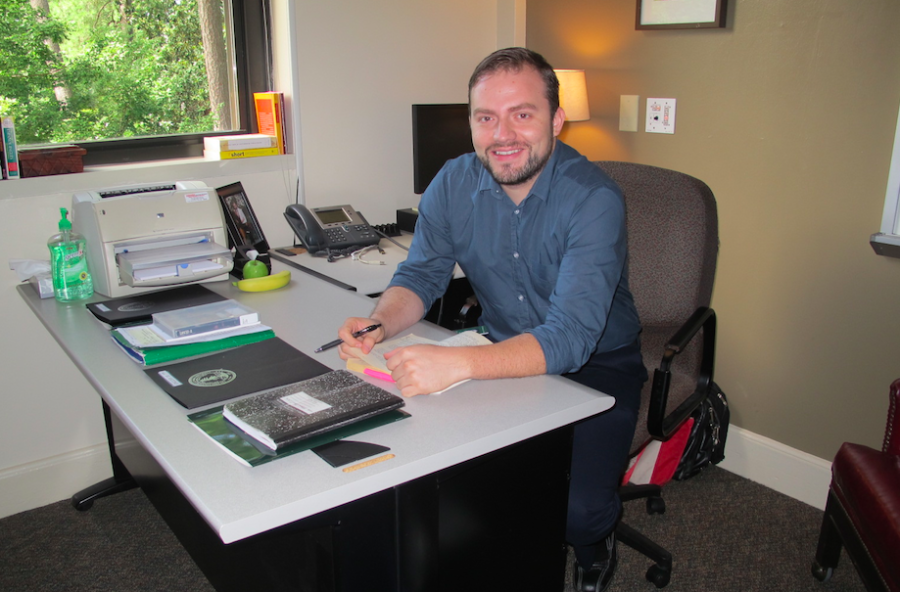Stanford resident poet takes on Upper School
The Upper School English Department has four new members in its lineup, one of which is Mario Chard. Chard grew up in northern Utah, and was later educated at Weber University and Purdue University. He just finished two years as a poetry fellow in the Wallace Stegner Fellowship program at Stanford University. After being published in Beloit Poetry Journal, Boston Review, Colorado Review, FIELD, and Indiana Review;and receiving the 2012 “Discovery” Boston Review Poetry Prize, Chard discovered his passion for teaching. He made the decision to move to Atlanta with his wife and sons and to teach English at Westminster.
Many people may still have questions about what a Wallace Stegner Poet really is and why it is so appealing.
“Each year Stanford chooses five poets and five fiction writers per year,” said Chard. “They choose from about 2,000 applications every year. It was obviously against very low odds. We didn’t anticipate it, my wife and I. When we got the email, we were thrilled and moved our whole life from Indiana to California.
As a resident poet, Chard had time to write and got paid to do it. He met with other poets weekly to discuss work, and he also had the opportunity to work both students and selected Stanford graduates.
Using this time, Chard was able to write numerous poems. One would think that must have a dark, gloomy tone to them, but Chard explained his logic behind them.
“I’m not funny in my poems,” he said. “I think I’m a happy, optimistic person, but the things that trouble me about the world come out through poetry; that’s how I try to understand them. In no way does it mean poetry is only about sad things. Most of the time, when we’re happy, we don’t want to talk about it—we just want to live it. I will try to make an effort to make my poetry more happy though.”
Mr. Chard is no stranger to teaching. Despite this being his first year teaching at Westminster, he discovered his passion for teaching while at Stanford.
“While I was there in the summers, I taught Stanford Collegiate Studies. Every summer, people would submit to come, and I would read and select 15 people to have class with. I loved those kids so much and working with that age group; I felt like I could contribute to them,” said Chard. “After working there, I realized I wanted to focus on teaching in the independent schools—not just in the classroom. I was interested in the student holistically.”
Westminster seemed to be the perfect match for Chard. Everything from students to fellow teachers all seemed to fit in perfectly with his ideals.
“When I was interviewed, I immediately fell in love with the campus,” said Chard. “This is heaven on earth. The students are smart, my colleagues are terrific, and the free food is great.”
Chard’s experience as a poet and deep understanding of the English language shape his unique philosophy for teaching. To him, teaching is parallel to the art of poetry.
“What I seek for as a poet is the same thing I seek for as a teacher. I think poetry at its heart is a pursuit of knowledge,” he said. “When you come to write a poem, there is this floating nebulous idea and emotion; you know you need to speak about it but you don’t know how yet. It is the same thing with students and college. They have this idea about the world, but it’s not clear yet. It’s the exact same pursuit and I love it.”
Though adapting to this the level of maturity in his class discussions may be challenging at first, students responded with enthusiasm and positivity toward their new teacher.
“I like Mr. Chard. He is a deeper kind of person, but at the same time, a very fun person,” said senior Ayodeji Bandele. “He brought new things to the program, such as starting class off with dreams and journaling. Things like that may have been important in the writing process but are not usually mentioned.”
“Mr. Chard’s class is more mature than any other English class,” senior Robert Durfee said. “My favorite thing is his calm dictation.”
Being able to aid students in pursuing their passion motivates Chard to teach, so he was enthusiastic to provide advice to students pursuing poetry.
“I have a lot of advice actually,” Chard said, “but I think the first advice would be: you have to read as widely and deeply as possible. There is a lot I could talk about enjoying the whole process but you have to read—to never stop.”
Chard has a variety of interests and pastimes outside of school and poetry. Whether it is TV shows or art, he only enjoys them when they’re superb or awful, never only mediocre.
“I love television,” Chard said. “I watch what I think is really good television, such as Shakespearean dramas and Breaking Bad and True Detective. My wife and I also really love shows like Buffy the Vampire Slayer and Doctor Who. Sometimes, it can be really bad television, but we love watching it. I am really high and low with art. With film, I am also the same way. I like really bad films and really good films; it’s the ones in the middle that I am not interested in.”
Chard proves that he is multi-talented, revealing that he plays the guitar because he loves the sound of it. He usedto like hiking, but he claims that it is not possible in the south due to the humidity.
His students can look forward to a more colorful classroom in the future as Chard is still in the process of decorating it.
“Ideas are welcome!” he said.





